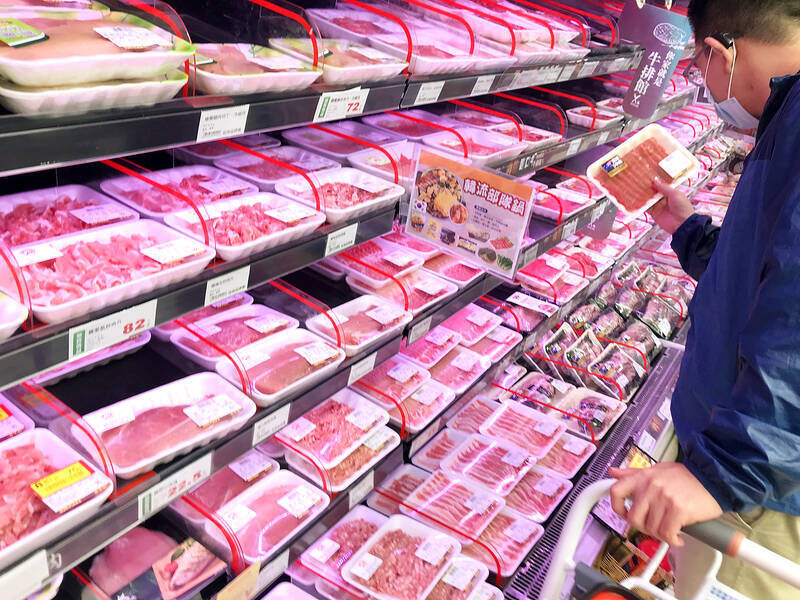The Consumers’ Foundation yesterday urged the government to insist on labeling agricultural products from the US, while Taiwanese trade officials engage in high-stakes negotiations over US President Donald Trump’s tariffs.
Although the specifics of Taiwan-US trade talks are classified, Washington’s demands could be guessed from those made by US officials in previous negotiations, foundation executive chairman Wu Jung-ta (吳榮達) told a news conference.
The US has long accused Taiwan of excessive inspection procedures for imported meat products and overly strict standards that did not align with international norms, he said.

Photo: CNA
Washington also considers the Food and Drug Administration’s safety tests to be a trade barrier, as they increase the chances of US products being found unsafe for consumption, he said.
US trade officials earlier this year demanded that Taiwan raise the legal limit on ractopamine residues in pork and stop banning the import of US beef offal, Wu said.
Taiwan reportedly tentatively agreed to open the door to US-produced minced beef and beef offal, and increase maximum concentration of ractopamine in pork from 0.04 parts per million (ppm) to 0.09ppm, in line with the Codex Alimentarius, he said.
The US might additionally demand that Taiwan stop listing the country of origin for US beef and pork, he said.
These demands are problematic because Taiwanese consume offal in larger amounts than US residents, resulting in increased exposure to animal drug residues, he said, citing the custom for post-natal women to eat pork kidneys.
The government must resist pressure from the US on labelling the country of origin to protect consumers’ right to know about the products they purchase, he said.
The foundation is “pessimistic” about the government’s ability to keep the current standards for ractopamine residues, he added.
Taiwan could respond by imposing stricter labeling rules on beef and pork produced in countries other than the US to ensure consumers can exercise their right to choose, foundation officials said.
Establishing online platforms and apps could help consumers exercise that right, they said.
Additionally, the government could mandate labeling all meat imports without country of origin information as high-risk products, they said.
US officials claim that lowering the restrictions on ractopamine residues is based on science, but the 2012 Codex Alimentarius guideline on the substance was rectified with a razor-thin margin of 69 “yea” to 67 “nay” votes, foundation secretary-general Chen Ya-ping (陳雅萍) said.
The Codex Alimentarius Commission’s decision on ractopamine was a political compromise not backed by scientific considerations, she said.
Taiwan prohibits US beef offal imports to prevent the spread of mad cow disease, which is caused by prions linked to ractopamine use, Chen said.
President William Lai’s (賴清德) recent comments that safeguarding food security and public health are the Taiwanese delegation’s priorities are an acknowledgement that the negotiations revolve around agricultural products, chairman Teng Wei-chung (鄧惟中) said.
Taiwanese negotiators should let former US president John F. Kennedy’s consumer bill of rights guide their endeavors, he said, adding the concept stipulated that the right to safety, right to be informed, right to choose and right to be heard are basic to consumers.

The manufacture of the remaining 28 M1A2T Abrams tanks Taiwan purchased from the US has recently been completed, and they are expected to be delivered within the next one to two months, a source said yesterday. The Ministry of National Defense is arranging cargo ships to transport the tanks to Taiwan as soon as possible, said the source, who is familiar with the matter. The estimated arrival time ranges from late this month to early next month, the source said. The 28 Abrams tanks make up the third and final batch of a total of 108 tanks, valued at about NT$40.5 billion

Two Taiwanese prosecutors were questioned by Chinese security personnel at their hotel during a trip to China’s Henan Province this month, the Mainland Affairs Council (MAC) said yesterday. The officers had personal information on the prosecutors, including “when they were assigned to their posts, their work locations and job titles,” MAC Deputy Minister and spokesman Liang Wen-chieh (梁文傑) said. On top of asking about their agencies and positions, the officers also questioned the prosecutors about the Cross-Strait Joint Crime-Fighting and Judicial Mutual Assistance Agreement, a pact that serves as the framework for Taiwan-China cooperation on combating crime and providing judicial assistance, Liang

A group from the Taiwanese Designers in Australia association yesterday represented Taiwan at the Midsumma Pride March in Melbourne. The march, held in the St. Kilda suburb, is the city’s largest LGBTQIA+ parade and the flagship event of the annual Midsumma Festival. It attracted more than 45,000 spectators who supported the 400 groups and 10,000 marchers that participated this year, the association said. Taiwanese Designers said they organized a team to march for Taiwan this year, joining politicians, government agencies, professionals and community organizations in showing support for LGBTQIA+ people and diverse communities. As the first country in Asia to legalize same-sex

MOTIVES QUESTIONED The PLA considers Xi’s policies toward Taiwan to be driven by personal considerations rather than military assessment, the Epoch Times reports Chinese President Xi Jinping’s (習近平) latest purge of the Chinese People’s Liberation Army (PLA) leadership might have been prompted by the military’s opposition to plans of invading Taiwan, the Epoch Times said. The Chinese military opposes waging war against Taiwan by a large consensus, putting it at odds with Xi’s vision, the Falun Gong-affiliated daily said in a report on Thursday, citing anonymous sources with insight into the PLA’s inner workings. The opposition is not the opinion of a few generals, but a widely shared view among the PLA cadre, the Epoch Times cited them as saying. “Chinese forces know full well that